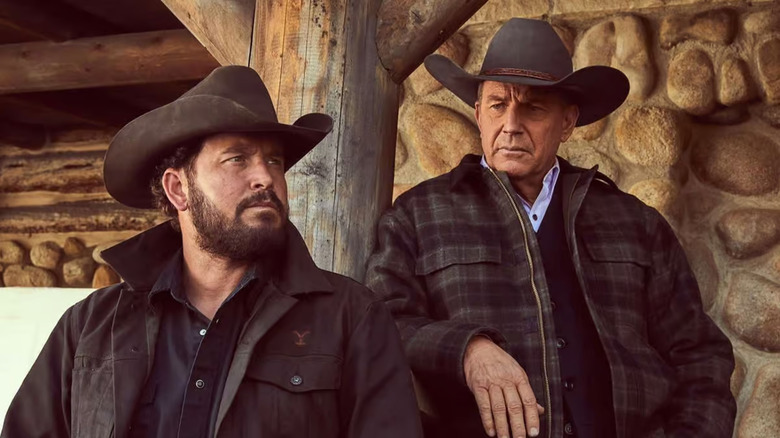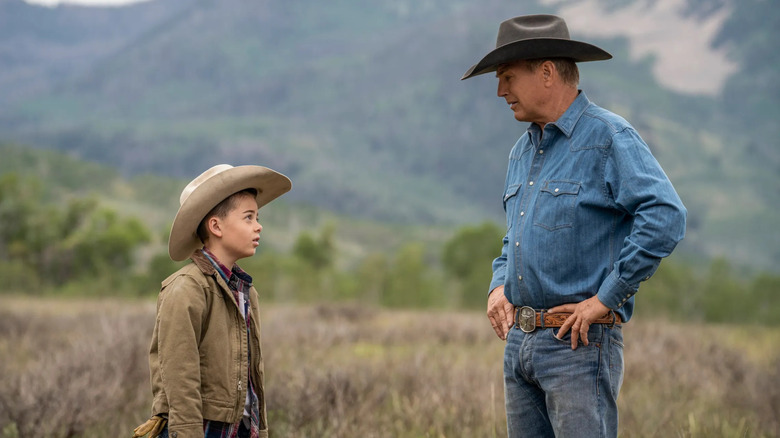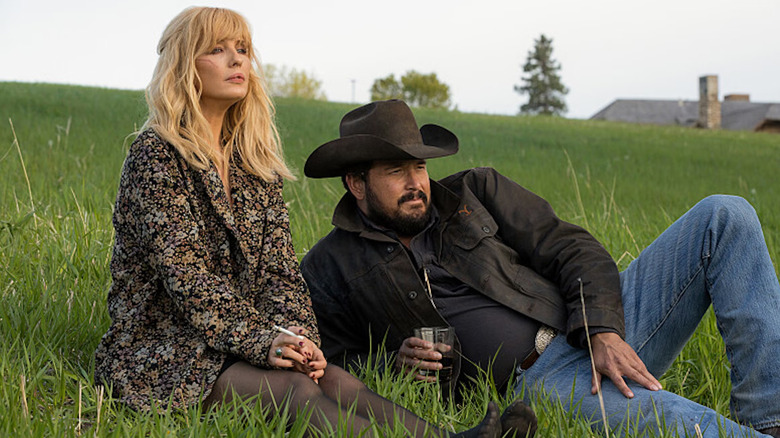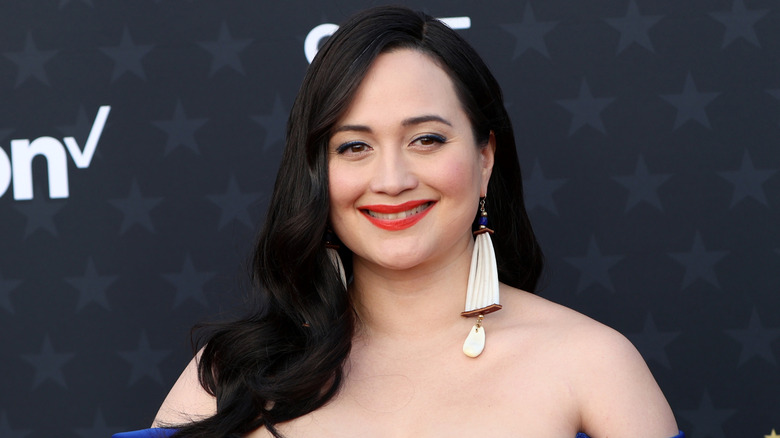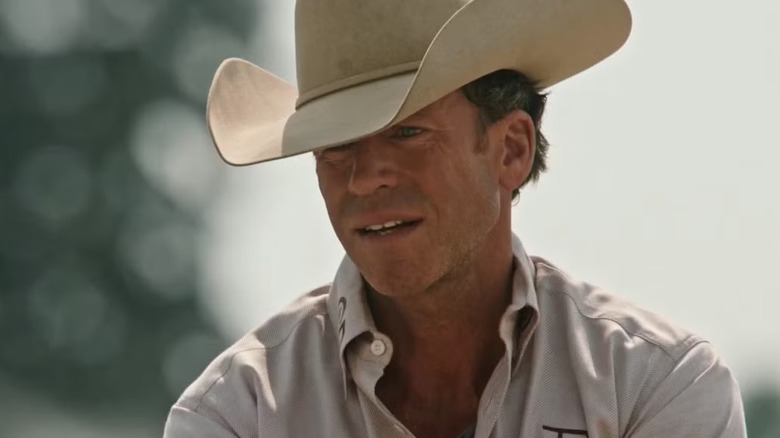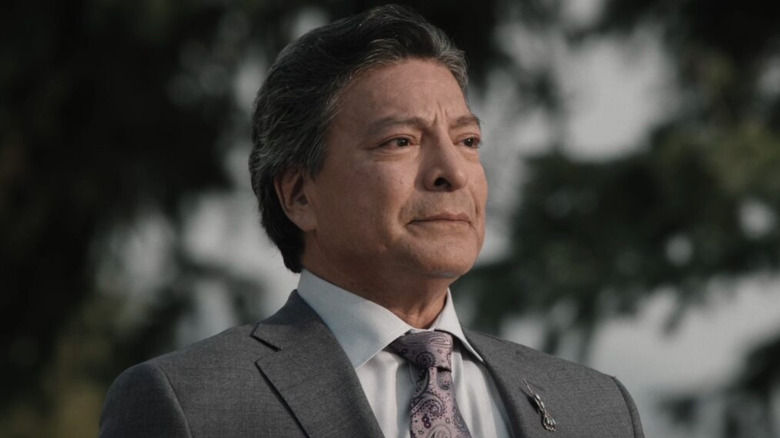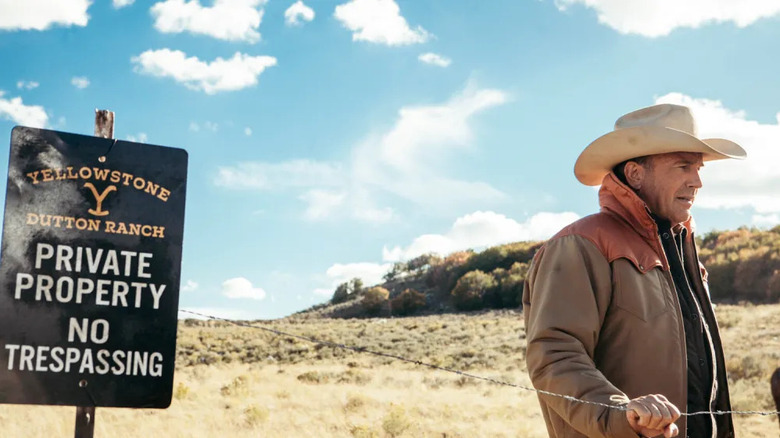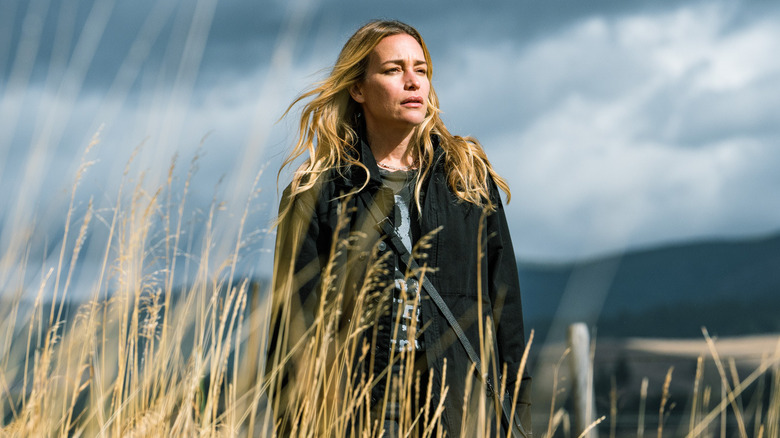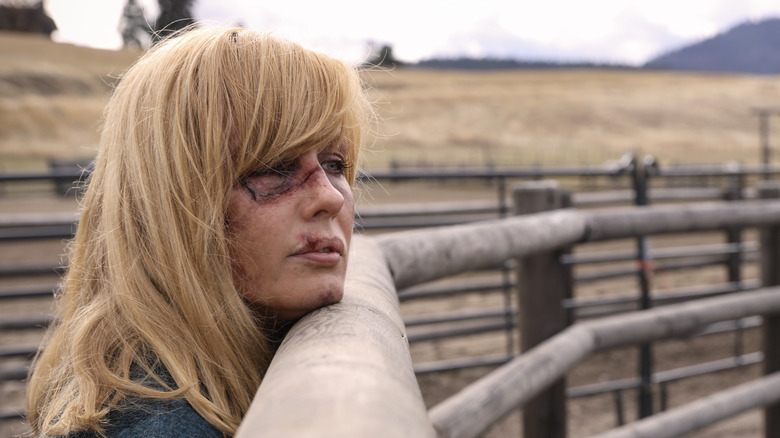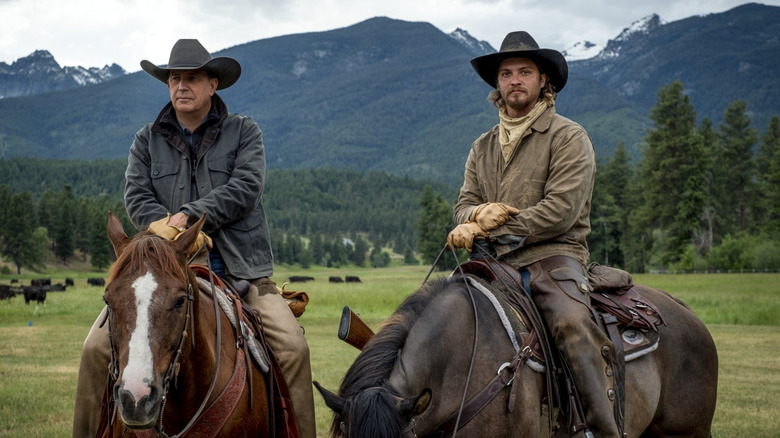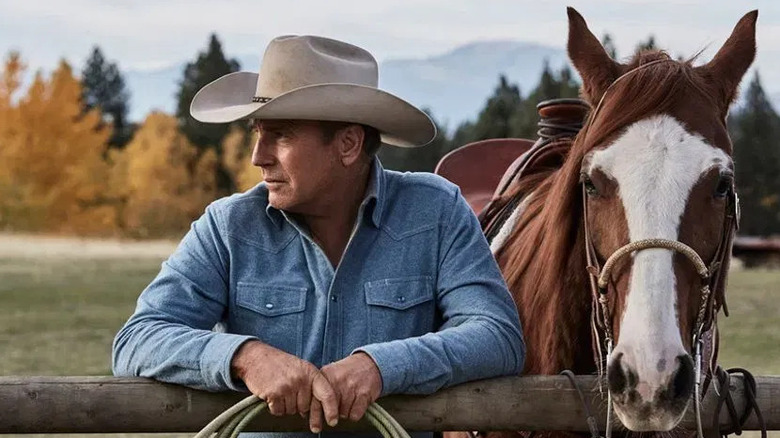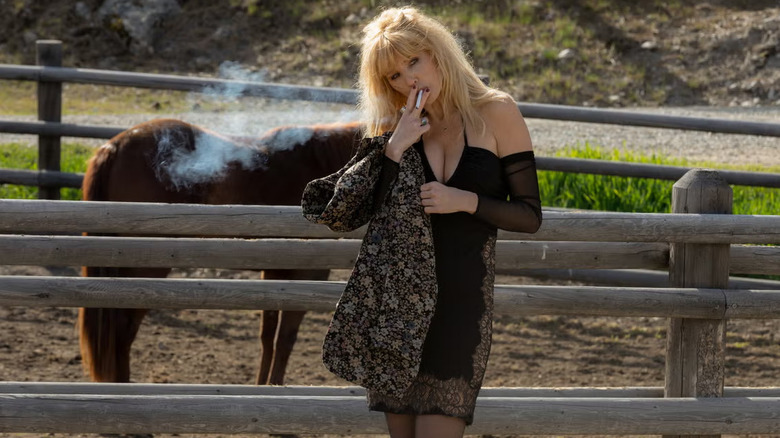Dark Details About Yellowstone
"Yellowstone" is anything but a lighthearted and cheery show. Regularly featuring dirty dealings, violent sibling confrontations, and other dark-hearted doings, the Western drama isn't afraid to be wicked or mean-spirited. And behind the scenes, things could apparently get just as wild and wooly. This is a series where its creator, Taylor Sheridan, and star, Kevin Costner, got into a legal dust-up over the latter's requested time off, an issue that ended up completely changing the show's final season and resulting in Costner's character, John Dutton, being removed from the program prematurely, even though the move resulted in the series coming to its conclusion with several unresolved loose ends.
But that's just the tip of the iceberg when it comes to the woes "Yellowstone" faced during its time on the air. Whether it's Native American groups taking the show to task for its inaccurate portrayals of rez life as well as casting non-native actors in native roles or the anger expressed by Montana ranchers and citizens who felt that the show did a terrible job representing life in the state, there are plenty of unpleasant behind-the-scenes details fans might not be aware of. Here are some dark details about various incidents that took place across the filming of all five seasons of "Yellowstone."
The Duttons' story reflects Montana's dark history
The Dutton family's story might sound like a fairytale at first blush: a hardworking family claims a chunk of Montana land, only to be told by their Native American neighbors that they have seven generations to make a go of it before the land will be returned to the tribes that originally occupied it. And indeed, thanks to John Dutton's hubris and the feuding of his children, ownership of the land ultimately reverts to Chief Thomas Rainwater (Gil Birmingham) and his tribe after Dutton's death — seven generations after his great-great-grandfather James (Tim McGraw) first settled the family there. It's one questionable thing fans ignore regarding the show's sometimes mystical treatment of the Dutton clan, and it also shines an inadvertent spotlight on one of the series' biggest problems.
Real settlers and tribes didn't tend to have similarly congenial relationships; to the contrary, millions of Native Americans were slaughtered in their battle to protect and save their lands. "Yellowstone" and its spin-offs only occasionally reflect this reality and the true harshness of the American West, though Kevin Costner was cognizant of this fact when he spoke with CBS' Sunday Morning in 2023. "The ranchers that came here, they didn't own this land.," the actor said. "They basically banded together and pushed out the Native population. It's still beautiful, but it's very easy to forget the drama. The things we will never recover from."
The cast had a long, difficult fight over pay increases
One of the biggest battles waged behind the scenes at "Yellowstone" only lasted for a few months, but it still managed to send a major ripple across Hollywood's economy. In the wake of Kevin Costner's rocky departure from the franchise, Kelly Reilly, Luke Grimes, and Cole Hauser allegedly banded together and held out for more money in order for them to stick with what was supposed to be a "Yellowstone" spin-off starring all three of them.
The actors knew they were worth the cash in the wake of Costner's departure because of the enormous plot voids their absences would have created if Paramount walked away from the negotiating table. It was reported that Hauser asked for $1.25 million per outing while Reilly originally wanted $1.5 million an episode before cutting her demand down to $1.2 million. Both wanted to be listed at the top of the call sheet over Matthew McConaughey, who was slated to be the program's lead. When Paramount balked, the requested amounts were reduced. There's no word as to how much Grimes asked for, but it was reportedly less than Reilly and Hauser.
The dispute was settled a few months later, and the rest of Season 5B was promptly filmed. The spin-off that would have featured the actors after the main series ended was ultimately split into three shows. Grimes will head up "Y: Marshalls" for CBS, and Reilly and Hauser will lead a Beth- and Rip-centered spin-off currently set for Paramount+. The original spin-off vehicle dropped McConaughey and transformed into "The Madison," which now stars Michelle Pfeiffer and will debut on Paramount+.
Lily Gladstone spoke out about the show's lack of faithfulness to real Native issues
Native American actors and activists have long critiqued "Yellowstone" for casting actors with unconfirmed or questionable ties to their Native roles. In spite of the fact that the show and its spin-offs have longtime actor Mo Brings Plenty working as an American Indian Affairs Coordinator, many have protested the way the show has portrayed Native life, even when it does feature actors confirmed to belong to the various tribes depicted on screen. Among those critics is Oscar nominee Lily Gladstone, who was quite frank in her estimation of the drama's worth.
The actor summed up her feelings about the show in two words. "Delusional! Deplorable!" she said to New York Magazine. "No offense to the Native talent in that, I auditioned several times. That's what we had." She has an issue with the show's lack of authentic Native points of view, especially in the writer's room. "You want to have more Natives writing Native stories," she said. "You also want the masters to pay attention to what's going on. American history is not history without Native history." With Taylor Sheridan single-handedly shaping any and everything related to the "Yellowstone" world, it's understandable why she found the show lacking.
Taylor Sheridan caused frustration by allegedly inflating the show's budget
Often outspoken and frequently brutally honest, Taylor Sheridan sometimes finds himself in public hot water. Back in 2023, the extravagant amount of money Paramount was paying Sheridan to use his ranch and cattle came under question, making headlines thanks to a Wall Street Journal exposé. According to the paper, in addition to being paid up to $50,000 a week to shoot on his own properties, he was charging Paramount $25 for each cow used on the show and was also allegedly paying a Texas wrangler $3,000 to take care of his horses while the shooting took place miles away in Montana.
Production company executives relayed their dismay to the paper, especially with Sheridan making apparent diva-esque demands that included the show's horses being shod by his favorite Texas-based horseshoe maker. That was a request that led to an interoffice email being fired off by David Glasser, head of 101 Studios, which allegedly read in part, "Are you kidding me? We can't find a local person?"
In the end, these expenses were accepted and generally overlooked in spite of executive grumblings because of how incredibly profitable "Yellowstone" and its spin-offs are. The trend of high-cost "Yellowstone" programs will apparently continue with "Y: Marshalls," as CBS President Amy Reisenbach told Deadline, "We don't do cheap." It's possible the bubble may burst sometime in the future, but right now, everything's caviar and cowboy hats.
The show's portrayal of Native life came under fire
Lily Gladstone wasn't the only Native actor to be critical of the way "Yellowstone" portrayed and cast its Native characters. The show was called out for the way it depicts Native American rituals in addition to the casting controversies that sprung up when actors of uncertain lineage, like Kelsey Asbille, were cast to play Native characters.
"We have a giant full-blood Native population here, but casting people and movie directors aren't tapping into that population," Craig Falcon, a Montana actor who's a member of the Blackfeet nation, told Voice of America News regarding the show's casting practices. "We're right back where we started, back in the days of Iron Eyes Cody, where you hire non-Natives and put them in braided wigs."
On top of that, Philimon Wanbli Nunpa, executive director of the Sicangu Lakota Treaty Council on the Rosebud Reservation, spoke out against the way "Yellowstone" portrayed the Hanbleceya, a sacred ceremony that the series shows Kayce Dutton (Luke Grimes) taking part in. "Whoever authorized this will need to be addressed in front of our medicine men," he said, adding that he disapproved of a non-Native character going on a vision quest. Mo Brings Plenty expressed his disagreement with these statements and pressed back, telling Voice of America that there was nothing in the scene that couldn't be found via a simple Google search.
Yellowstone was accused of mutilating a cow for a scene
One of "Yellowstone's" ugliest behind-the-scenes incidents took place in 2018 when an on-set whistleblower contacted PETA with the claim that a real cow had been mutilated as part of an onscreen storyline. "[A]s the sun came up and the temperature increased, we knew right away that it was not a prop. We knew that it was real. [...] It's terribly heartbreaking," the whistleblower told PETA in part, providing the organization with videos and images that allegedly show animals being abused. They also claimed that the sight and smell of the dead animals shook the crew, causing a stench that spread over the area and coated people's bodies.
Paramount denied that a cow corpse was ever used in the show's production. "Paramount Network takes animal safety very seriously and with utmost professionalism," Kurt Patat, Paramount Network Senior Vice President of Communications said in part in a statement published by The Wrap. "All animals are monitored on set by professional handlers. We have been in touch with PETA which presented us with inaccurate claims that we were able to correct including no cows were killed or mutilated for the scene in question."
But PETA stood by their story, responding, "If Paramount had nothing to hide, it would have come clean about where the cows came from instead of going on to ban cell phones from set while shooting a controversial rodeo scene."
Yellowstone got heat for mocking environmentalists
Perhaps inspired by the Season 2 fight with PETA, "Yellowstone" mocked animal rights groups during Season 4 through the character of eco-terrorist Summer Higgins (Piper Perabo), who finds herself forced into near servitude after she's convicted of vandalism. The story heavily underlined one of the show's main points: ranching is very good, and any argument that the industry is destroying the environment, bad for the health of humans, or has other negative effects on the world ought to be scoffed at and dismissed.
Environmentalists have long pointed out that the show's portrayal of the way ranching impacts the planet is facile at best and one-sided at worst. "The land Dutton's family stole from the Native Americans belongs to Monica's people and to the buffalo, elk, antelopes, grizzlies and wolves that need Yellowstone Dutton Ranch to function as an integral part of a whole, vibrant and sustainable ecosystem," remarked Scott Russell Smith on the Friends of Animals homepage regarding Summer's storyline. But the show never backed down, and that sentiment continued to rage until the series came to an end.
Yellowstone was critiqued for its violence
"Yellowstone" was actually quite popular with critics. Though it never scaled the heights of Emmy accolade heaven achieved by other dramas like "Succession" or "Better Call Saul," many of the reviews given to Taylor Sheridan's Western were largely positive. But despite the generally positive critical response, the murder-and-gun-heavy show has often been critiqued for its use of onscreen violence.
In an example of a less-than-glowing review, The Guardian's Michael Hann praised the show's moral ambiguity but tutted "Yellowstone" for its use of weapons, blood, and brutal onscreen murder, declaring, "So violent is Yellowstone, in fact, that rather than this being Succession set on a ranch, a more apt comparison may be that it is Game of Thrones set on a ranch." That's quite the statement, but Hann wasn't finished, adding, "Justice in Yellowstone is a medieval concept, meted out on the hoof (often literally, from horseback) without recourse to lawbooks. Miscreants are hanged summarily, and the Duttons dish out punishment as they see fit, sorting out any difficulties with the legal authorities late."
Interestingly enough, watchdog group The Parents Television And Media Council actually praised the heavily edited version of "Yellowstone," which aired on CBS, saying that it was appropriate for children to view.
Montana ranchers accused it of giving their business a bad name
Though it brought a lot of tourism dollars and attention to Montana, plenty of ranchers who make their living actually doing what John Dutton pretends to do loathe "Yellowstone" and believe that the show gives their industry an awful reputation. While some ranchers said that they saw more tourists visit their property due to Taylor Sheridan's drama, others said that the show made it harder for them to conduct their business.
One rancher interviewed for a Washington Post article about the impact the hit series had on Montana believed "Yellowstone" was harming the ranching industry's reputation. "The show has given our ranchers a bad name," Mark Greeno, who worked at Nine Quarter Circle Ranch, bluntly opined. While everyone else speaking with the paper had a positive opinion about the attention the show brought to the area, Greeno didn't think it was good for his particular industry.
Other residents of the state had less damning thoughts to share, with criticisms that focused instead on the less important inaccuracies the series fostered in its audience's collective mind. "One thing I've noticed is that 'Yellowstone' was only shot in the summer, so people are blown away that it's cold, that the wind blows up here," remarked Nathan St. Goddard, a cafe owner, about the show's chosen locale. "It looks like it's 80 degrees and perfect temperatures in 'Yellowstone.'"
It damaged the economy of Utah by moving production
While those beautiful hills and sweeping vistas you see in the first few seasons of "Yellowstone" are meant to depict the wilds of Montana, they actually exist in Utah. In fact, about seventy-five percent of Season 1 through Season 3 was shot in the Beehive State, which is why state officials were so upset when the series filmed the entirety of its final two seasons in Montana.
As you might expect, the move was made due to financial reasons; when the show hit Utah's $8.3 million cap on tax rebates and incentives, production moved to Montana, where the cap started at $10 million and was raised to $12 million by the state's senate. This was in spite of the fact that the show had been the beneficiary of at least $7 million a season in incentives from Utah. The move meant that the state lost a $30 million a year spending boon that "Yellowstone" had been bringing to it.
"In the tourism industry, they get excited when there's a convention that comes to town and they stay in hotels for a week, right? Having a show like 'Yellowstone' is like having a five-month convention," lawmaker Marshall Moore told Desert News. "I talked to dozens of people on that crew and some of the cast. They were really sad and heartbroken. They had made a home here. Some of them had basically bought homes here, you know, and put their kids in school." Unfortunately for all who were affected by the move, the show never returned to Utah.
The show was accused of ruining Montana's image at large
Montana ultimately became the permanent home to the drama, but plenty of the state's residents who weren't ranchers believed that "Yellowstone" made lives difficult for those who live in the state even before it was shot there. Outside/In debated this topic, claiming that the series was responsible for drawing an outsider class to the state and changing its financial demographic.
Other local journalists agreed, including Johnathan Hettinger, who wrote in In These Times Magazine, "When I think of Yellowstone, I'll remember the place it came to dominate in our culture [...] And I'll remember the damage it left behind: a Park County warped by gentrification, where an intact ecosystem has been commodified into a backdrop for cosplay and profit."
Park County isn't the only place in Montana the show has been accused of ruining. Yellowstone Park itself has endured its own problems as more people have moved to or visited Montana, disturbing the rhythms and patterns of the ecosystem and the wildlife that lives there. While it's arguable that "Yellowstone" only had a minor influence on such matters, by increasing the state's worth as a tourism destination, it's definitely had a negative impact on the area.
